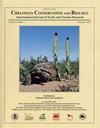温度对红足龟性别决定和胚胎发育的影响
IF 0.8
4区 生物学
Q3 ZOOLOGY
引用次数: 7
摘要
摘要了解生殖生物学和胚胎发育对于指导濒危物种的保护计划至关重要。红脚龟是一种脆弱的物种,其性别决定机制和过渡温度范围尚不清楚。为了获得这些信息,我们在3个恒定温度下孵化了145个蛋(38个巢):29°C、31°C和33°C。所有胚胎在33°C(n = 49)在潜伏期的前三分之一期间死亡。在31°C(n = 47),只有10.6%孵化,2.12%的胚胎出现甲壳、头部或腿部畸形。在29°C(n = 49),52%成功孵化,10.2%出现身体畸形。从获得的30名新生儿中,我们能够通过腹腔镜对20名个体进行性行为,通过性腺组织学对2名个体进行了性行为,其中1名由于死亡时性腺体积较小而无法识别,其余的则在没有进行性行为的情况下被放回龟类采集地。这些结果表明,C.carbonarius表现出温度依赖性的性别决定机制,雌性产于29°C或以上。我们对胚胎畸形、孵化不同步和卵黄吸收不完全的偶然发现表明,该物种可能能够通过胚胎滞育、夏眠或两者兼有来阻止胚胎发育。未来的研究应侧重于该物种的发育生物学,包括确认在29°C以下的温度下雄性的产生。本文章由计算机程序翻译,如有差异,请以英文原文为准。
Effects of Temperature on Sex Determination and Embryonic Development in the Red-footed Tortoise, Chelonoidis carbonarius
Abstract Understanding reproductive biology and embryonic development is vital to guide conservation programs for endangered species. The Red-footed Tortoise, Chelonoidis carbonarius, is a vulnerable species for which the sex determination mechanism and the transitional temperatures range are unknown. In an attempt to obtain this information, we incubated 145 eggs (38 nests) at 3 constant temperatures: 29°C, 31°C, and 33°C. All embryos incubated at 33°C (n = 49) died during the first third of the incubation period. Of the eggs incubated at 31°C (n = 47), only 10.6% hatched, and 2.12% of the embryos showed malformations of the carapace, head, or legs. Of the eggs incubated at 29°C (n = 49), 52% hatched successfully with 10.2% exhibiting body malformations. From the 30 neonates obtained, we were able to sex 20 individuals by laparoscopies, 2 by gonads histology, 1 was impossible to identify because of the small sizes of the gonads at the time of death, and the remaining were released back to their tortoise origin of collection without being sexed. These results suggest that C. carbonarius exhibits a temperature-dependent sex determination mechanism with females produced at, or above, 29°C. Our incidental findings of embryo malformations, asynchronous hatching, and incomplete yolk absorption suggest that this species may be able to arrest embryonic development via embryonic diapause, aestivation, or both. Future studies should focus on the developmental biology of this species including confirmation of the production of males at temperatures below 29°C.
求助全文
通过发布文献求助,成功后即可免费获取论文全文。
去求助
来源期刊
CiteScore
1.70
自引率
14.30%
发文量
17
审稿时长
>12 weeks
期刊介绍:
Chelonian Conservation and Biology is a biannual peer-reviewed journal of cosmopolitan and broad-based coverage of all aspects of conservation and biology of all chelonians, including freshwater turtles, marine turtles, and tortoises. Manuscripts may cover any aspects of turtle and tortoise research, with a preference for conservation or biology. Manuscripts dealing with conservation biology, systematic relationships, chelonian diversity, geographic distribution, natural history, ecology, reproduction, morphology and natural variation, population status, husbandry, community conservation initiatives, and human exploitation or conservation management issues are of special interest.

 求助内容:
求助内容: 应助结果提醒方式:
应助结果提醒方式:


